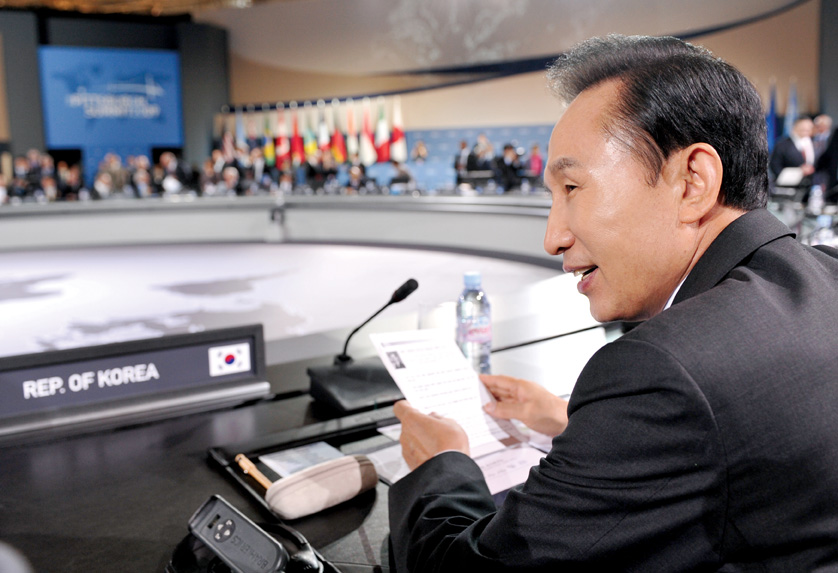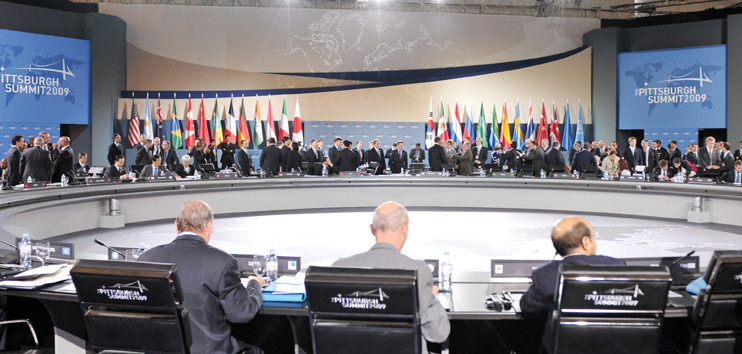Korea to Host 2010 G-20 Summit
President Lee says G-20 Meeting great chance for Korea to play major role in world affairs
 Korea clinched the right to host the G-20 Meeting in November 2010, becoming the first Asian country to hold the key international meeting.
Korea clinched the right to host the G-20 Meeting in November 2010, becoming the first Asian country to hold the key international meeting.
President Lee Myung-bak and Canadian Prime Minister Stephen Harper jointly announced that their countries will host the two G-20 Meetings next year, Canada in June and Korea in November. The announcement was made in Pittsburgh, Pennsylvania, the United States, the site of this fall¡¯s G-20 Meeting.
The media played up the news, quoting foreign media reports that the event will bring immeasurable benefits to Korea in terms of diplomacy and economy as big, perhaps, as the 1988 Summer Olympics in Seoul.
President Lee said during a special news conference on Sept. 30 that Korea was fortunate enough to bring the most important political gathering in the world to one of its cities yet to be named. It is an opportunity for Korea to join the advanced countries by taking advantage of the worldwide prestige that it will win and its resultant heightened visibility in the world, which is likely to help its endeavors in many ways, such as exports.
The Chief Executive said he will lead the country in making the global event an opportunity to boost the national fortune, as it would be a chance to gauge Korea¡¯s advanced position in the world. He stressed that it will transform the understanding of Korea with ¡°From periphery to center¡± as the theme.

The president recalled that he was very moved when the announcement that Korea will be the host for the G-20 Meeting in November 2010 was made at the end of the G-20 Meeting in Pittsburgh on Sept. 25. He said he was so grateful that he is the president of a country with such great people. ¡°Korea now has become a major player in the international community as recognized by advanced countries. We no longer are a passive player looking at what others have created in international orders, but the one who can help make new rules and frame new policies,¡± Lee said.
Korea will play the role of a bridge between advanced and developing countries with its abundant experience in the area of economic advancement, Lee said. He will also see that Korea takes an active role in settling the North Korean nuclear issue. He said both South and North Korea are the parties directly involved in the issue, but the South has been unable to lead the negotiations to denuclearize the North, although it is a global issue for the United States and China. If the South has good ideas to solve the issue, it can certainly discuss them with other parties engaged in the Six-Party Talks, the president said.
President Lee said he doesn¡¯t see any discord on the Grand Bargain that he proposed while in Pittsburgh at the G-20 Meeting. The U.S. was briefed on the proposal before it was officially announced and did not have any objections, the Korean government said.
He said the G-20 has become the consultative body for global governance, the premier forum, a permanent structure to discuss and settle global problems during its regularly scheduled meetings. About two-thirds of the global population live in the member countries and contribute 85 percent of the world¡¯s GDP, he said to describe the importance of the Group of 20 as opposed to the Group of 8.
Korea, as the chair country for the G-20 Meeting next fall, will chose the countries to attend and will propose new ideas for international order, not limited to just coordinating the agreements at the gathering.
Next year¡¯s November G-20 Meeting will have a number of key global issues to solve as about 30 heads of state will gather in a Korean city yet to be named.
One of the major issues is creating a cooperative system to secure sustainable, balanced growth in the world by adopting a model for world economic growth in the post economic-crisis world. Ways to make economic growth between the rich and poor countries more balanced must be addressed.
Another major item to be on the agenda will be the reform of global financial regulations: the strengthening of the monitoring system of financial institutions and creating standards for the regulation of capital on a global basis.
The reform of global financial institutions such as the International Monetary Fund (IMF) looms as another important issue at the upcoming G-20 Meeting.
Climate change will be another key subject for discussion at the gathering, especially the reduction of greenhouse gas emissions and securing resources to bring that about with the coordination of global institutions including the United Nations.
Reconfirmation of effectiveness of mutual exit strategies would be another key subject on the agenda, along with commentaries on each country¡¯s exit strategy, especially, its timing and order.
The event will bring enormous benefits to Korea, not only in monetary terms, said Chairman Sakong Il of the G-20 Planning and Coordinating Committee and concurrently chairman of the Korea International Trade Association.
Around 50 KITA officials led by KITA Vice Chairman Oh Young-ho welcomed the chairman as he arrived at the Korea Trade Center in Samsung-dong, southern Seoul, where KITA is located. They wanted to share in the excitement of Korea clinching the right to host the G-20 Meeting next year and to show their appreciation to the KITA chairman for successfully guiding the committee toward bringing the key international meeting to Korea next year.
During an interview with Korean media, he said Korea¡¯s hosting of the G-20 Meeting opens a new chapter in the country¡¯s diplomatic history. South Korea became a member of the United Nations only in 1991, and it was a passive member of the international community until recently with its economy expanding enormously enabling Korea to break out of the ¡°developing country¡± mold.
It is impossible to count the benefits from hosting the event in numbers, as some 30 heads of state and 2,000 in their entourages will visit Korea for the event, including from non-member countries like Spain and the Netherlands. Thailand and Ethiopia, will send representatives to the meeting, representing their respective countries as well as ASEAN and Africa. There also will be heads of such international institutions as the World Trade Organization (WTO), the International Monetary Fund (IMF) and the Organization for Economic Cooperation and Development (OECD).
As such, the impact on a country that hosts such an important global meeting is so great it cannot be shown in statistics. It boosts the country¡¯s international standing by upgrading it in such areas as economy, society, culture and politics.
The G-8 Meeting had been unable to solve any global issues, although it often ended the meetings in total agreement among the members. It was previously the G-7, but later changed to the G-8 to include Russia. So far, G-20 Meetings have not only come up with measures to solve problems, but have also moved them into action.
¡°The current global economic crisis is already nearing an end, thanks to the action taken by individual countries to solve their economic problems. At the center was the G-20 in a move to push for stimulus packages by each country, which will lead the G-20 to being seen as the premier forum in the world,¡± Chairman Sakong said.
The biggest turning point in getting the global meeting staged in Korea was France¡¯s desire to create a G-14 Meeting. Korea knew of the French plan before it got off to a start and persuaded France not to reject the plan to form the G-20, along with help from the United States, Britain and Canada, the chairman said. He added that the government got help from China and Japan as well. Japan sided with Korea on the formation of the G-20, despite its early call for retaining the G-8 as the major global forum.
The KITA chairman said his three meetings with Chairman of the National Economic Council at the White House Larry Summers were a major help in getting the G-20 Meeting to Korea. Sakong said Korea agreed with the U.S. and Britain in giving priority to solving the current economic crisis rather than the financial regulatory reform pushed by France and Germany for the reason that the world needs to remove the economic crisis from the picture before settling down to discuss financial regulatory reform. nw
President Lee Myung-bak delivers a speech at the G-20 2009 Summit in Pittsburgh, the United States Sept. 24-25.
A view of the G-20 Summit in Pittsburgh, the United States.
Photo by courtesy of the MCST
3Fl, 292-47, Shindang 6-dong, Chung-gu, Seoul, Korea 100-456
Tel : 82-2-2235-6114 / Fax : 82-2-2235-0799